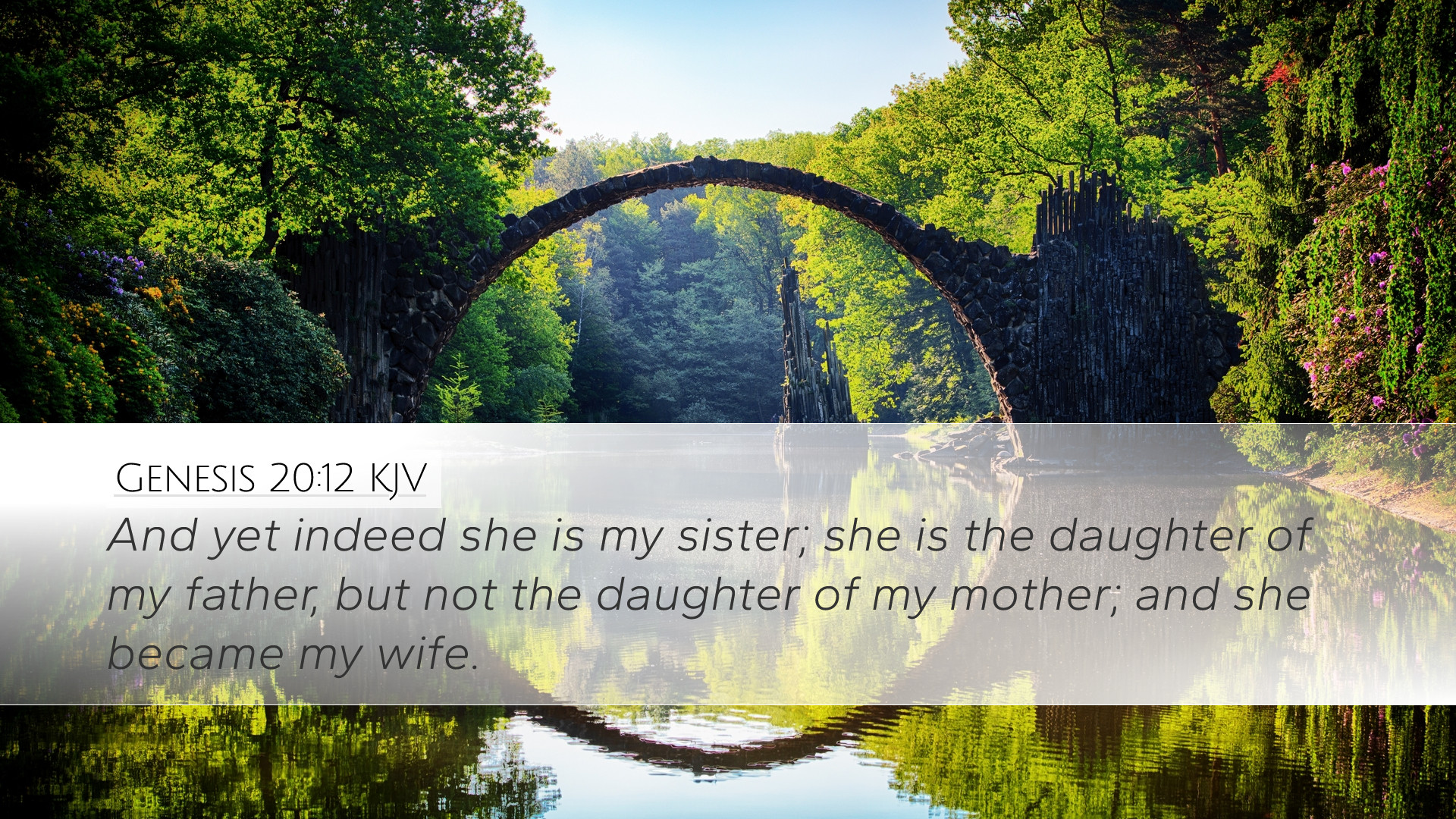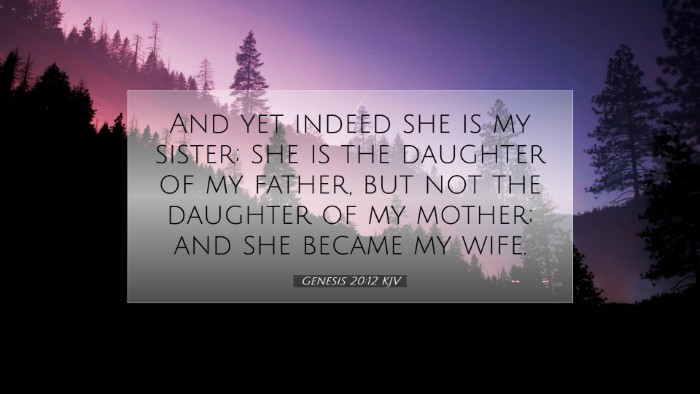Commentary on Genesis 20:12
Verse Reference: Genesis 20:12 - "And yet indeed she is my sister; she is the daughter of my father, but not the daughter of my mother; and she became my wife."
Introduction
This verse presents a significant moment in the narrative of Abraham and Sarah. It raises critical theological and ethical questions and highlights the complexities of human relationships, truth, and divine providence. By examining this verse through the insights of esteemed public domain commentators such as Matthew Henry, Albert Barnes, and Adam Clarke, we can gain a deeper understanding of its implications.
Contextual Background
Before delving into the analysis of Genesis 20:12, it is essential to establish the historical context. Abraham, having entered the land of Gerar, presents Sarah as his sister due to fear of the local king, Abimelech. This narrative echoes a previous episode in Genesis 12, where a similar situation arose in Egypt.
The Nature of Truth
Abraham's declaration that Sarah is his sister raises questions regarding the nature of truth and deception. According to Albert Barnes, Abraham’s characterization is not entirely false, as Sarah is indeed a half-sister. However, this partial truth highlights the moral ambiguity present in the narrative. The ethical implications of manipulating truth for self-preservation are profound and intimately connected to theological discussions on integrity and faith.
Theological Reflections on Relationship
Matthew Henry discusses the significance of the relationship between Abraham and Sarah. Their union, which began as a familial bond, reflects on the complexities of marital relationships. The commentary elucidates that this situation might serve as a reminder of the importance of clarity and honesty within marriage. Moreover, this instance reflects God’s providence in using flawed individuals to fulfill divine purposes.
Faith and Fear
Abraham’s actions also reveal the tension between faith and fear. Adam Clarke emphasizes that despite being a man of faith, Abraham succumbed to fear, leading him to take actions that contradicted his testimony of trust in God’s protection. This conflict is representative of the broader human experience whereby faith can be tested by situational pressures. Abraham’s response serves as a cautionary tale for believers, reminding them of the necessity of reliance on God amidst uncertainties.
Character Analysis
Abraham's Leadership
As a patriarch, Abraham's example is pivotal in understanding leadership within a faith context. Barnes notes that leaders are often placed in difficult situations where their moral decisions bear significant consequences not only for themselves but for those they lead. It propounds the discussion of moral failure and restoration, as Abraham is later portrayed as a model of faith once again.
Sarah's Role
Sarah’s involvement in this narrative also merits examination. Her position as both sister and wife challenges traditional roles and expectations. Henry contemplates the implications of her silence in this scenario and the societal pressures that likely influenced both Sarah and Abraham's actions. The dynamics within their relationship provide a lens through which to explore the complexities of female agency in the Old Testament context.
Divine Providence and Human Flaws
A recurring theme in this passage is the intersection of divine providence with human failings. Clarke emphasizes that despite Abraham’s lack of faith, God’s sovereignty remains unchallenged. God intervenes to protect Sarah and ensure the fulfillment of His covenantal promises. This duality prompts a reflection on how God can work through human imperfections to achieve His will, providing hope for believers who struggle with their shortcomings.
Lessons for Modern Believers
Genesis 20:12 offers multifaceted lessons for contemporary readers, including:
- The Importance of Integrity: Honesty in relationships is crucial, and believers are called to uphold truth, even when faced with adversity.
- Faith Under Pressure: This passage serves as a reminder that faith is often tested, and it encourages believers to rely on God’s promises rather than succumbing to fear.
- Understanding God’s Sovereignty: Regardless of human failures, God's plans will prevail, offering assurance that He can bring good out of challenging circumstances.
- The Complexity of Relationships: The text invites reflection on the nature of familial and marital bonds, reminding readers of their responsibilities towards one another.
Conclusion
Genesis 20:12 encapsulates profound themes of morality, faith, and divine providence. The insights drawn from the commentaries of Matthew Henry, Albert Barnes, and Adam Clarke enhance the richness of this narrative, inviting deeper reflection for pastors, students, theologians, and Bible scholars. The complexities of truth and the ramifications of our choices continue to resonate, providing timeless lessons for believers in their walk of faith.


